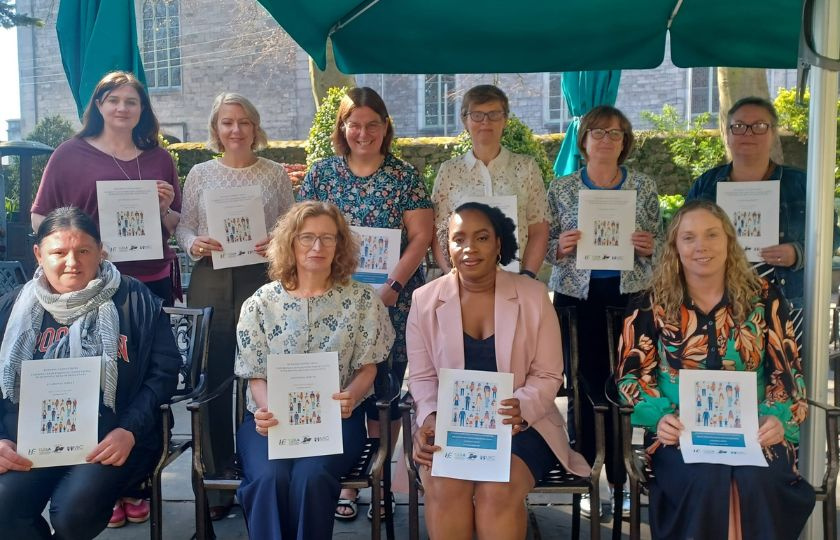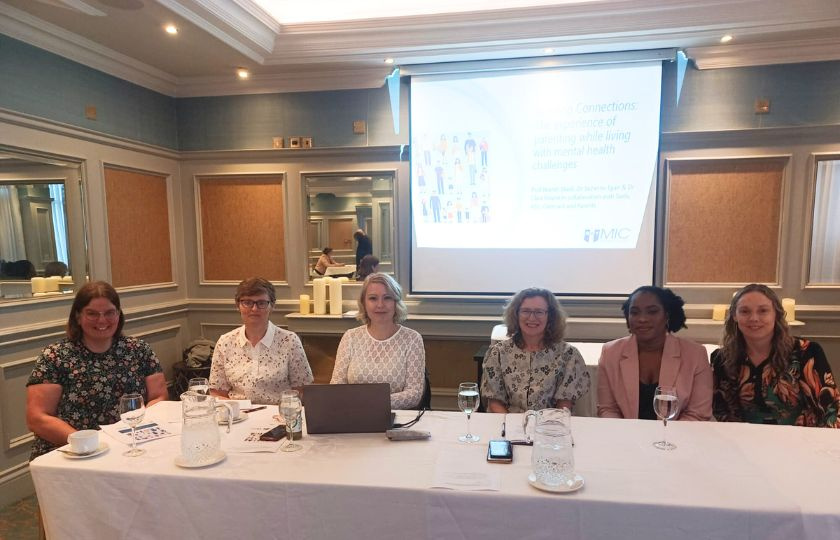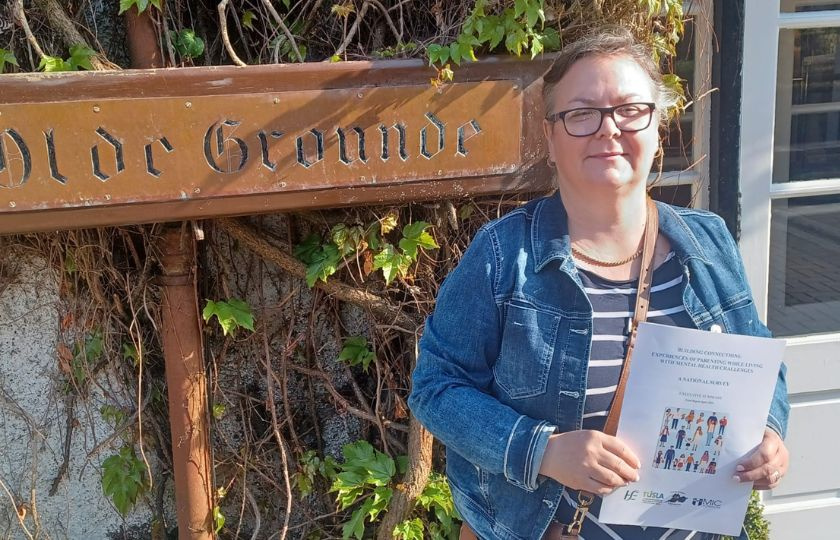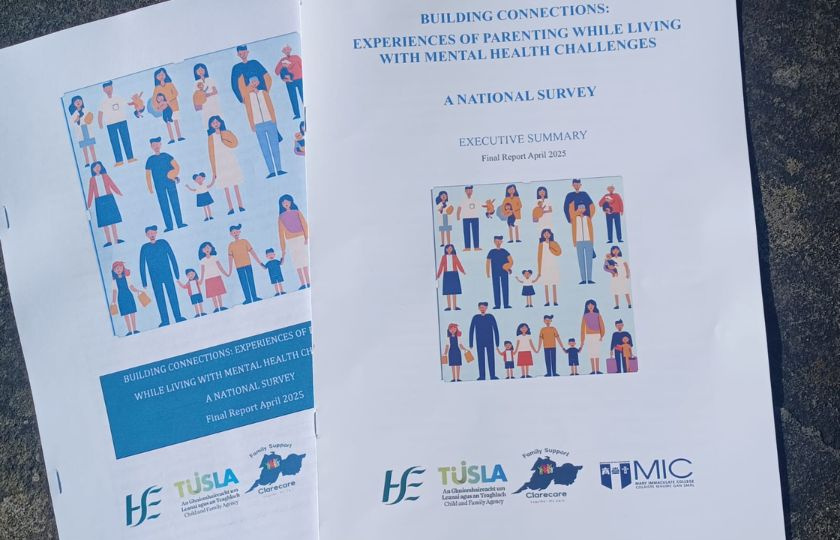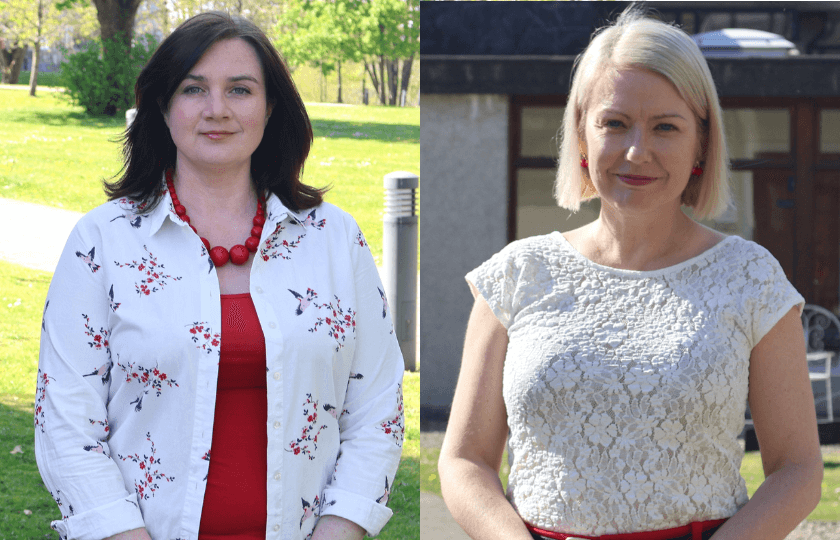
The Department of Psychology in Mary Immaculate College (MIC)—in partnership with parents, the HSE, Tusla and Clarecare—has launched new findings from funded research which examined the experiences of parents living with mental health challenges.
Over 200 parents from around Ireland completed the anonymous online survey when it opened on World Mental Day last October. Entitled Building Connections: Experiences of parenting while living with mental health challenges, the study aimed to find out more about the difficulties parents face, and the supports and barriers that are in place in terms of seeking help. The publication was launched in Ennis on Friday 11 April.
The survey findings showed considerable difficulties for parents with mental health challenges in terms of increased parenting challenges. These challenges included access to appropriate parenting supports, balancing medication needs and side effects with parenting responsibilities, and speaking with their child about their mental health challenges.
One parent who responded to the survey commented that: “I felt so bad because I thought as a parent, I should have been the stable person, the person with answers, the person who could control their emotions. I’ll never forget the look on my daughter’s face on the day I broke down.”
Other key findings showed that for parents with mental health challenges:
- 83% said their parenting challenges were sometimes or always more difficult because of their mental health challenges
- 66% had more than one mental health challenge (e.g., anxiety and depression)
- 67% had taken medication at some stage for their mental health challenge, but 54% said their role as a parent was not included in discussions around their medication
- 46% did not know where to access parenting supports
Commenting on the findings, Professor Niamh Stack, Head of the Department of Psychology at MIC and one of the researchers involved in the project noted: “We know that many parents experience mental health challenges, but these findings show that a lot of parents feel alone and unsupported in the difficulties they face. Parents also expressed the sense of stigma and fear they feel around sharing their mental health challenges. We are grateful that so many parents shared their experiences in this study and wanted their voices to be heard. We hope this important and timely research will help develop better supports for parents and families.”
The other MIC researchers involved in the project were Dr Suzanne Egan and Dr Clare Hoyne from the Department of Psychology.
Tracy Dsane, a Clare parent on the research working group highlighted that “the fact that the survey was anonymous, that nobody could identify you, was a great opportunity to pour your heart out”.
Taryn Fitzpatrick from Tusla Prevention Partnership and Family Support emphasised that: “Parental Participation is the central component of this research. We are so thankful to the parents who generously gave their expertise on the working group and to each of the parents who shared their experiences in the survey; this is the strength of this research.”
Martina Kilcommins, Senior Social Work Practitioner in the HSE, highlighted that “Hearing directly from parents living with mental health challenges has been a powerful reminder of the importance of truly listening to lived experience in shaping better support. It really helps me to ‘THINK PARENT, THINK FAMILY’ in my work with service users".
Adding to this, Joanne Perill, a Team Leader from Clarecare Family Support Service, said: “The findings of this research evidence the real-life links between parenting and mental health so it is essential that agencies consider both when providing services.”
Previous Irish research suggests that approximately 23% of families have at least one parent who has experienced a mental health disorder (Mulligan et al., 2021), with adults in Ireland having one of the highest incidences of mental health illness across Europe (OECD, 2021). Research is essential to target what kind of support is needed and what will be most beneficial to families.
About the Partners
Tusla - Child and Family Agency
The Child and Family Agency, established on January 1, 2014, holds responsibility for a wide array of statutory functions, including child protection, alternative care, regulatory services, and various family support services. Tusla has embarked on a major improvement program which emphasises Practice, Culture, and Structure. Currently, it manages a budget of over €1.1 billion and employs over 5,500 people in 350 locations countrywide. Tusla’s services cover child protection and welfare, family support, alternative care, adoption, Tusla Education Support Services (TESS), children's service regulation, and counselling and therapeutic supports.
About HSE
The Health Service Executive (HSE) provides a broad range of health services for Ireland, providing a lot of important support work and funding to ensure healthcare is accessible to all. HSE Social care professionals work with individuals and families to address a range of issues. Teams offer information and advice to help access community services and can also set up and monitor family support services.
About Clarecare
Clarecare is the largest Clare-based not-for-profit agency providing a wide range of support services for people in County Clare. Clarecare has a long history of providing family support services which are funded by Tusla. The following services are provided: Parents Support Line and other resources for parents; group-based parenting programmes; support for children and adolescents; individual support for parents, and advocacy service for parents of children in care.



